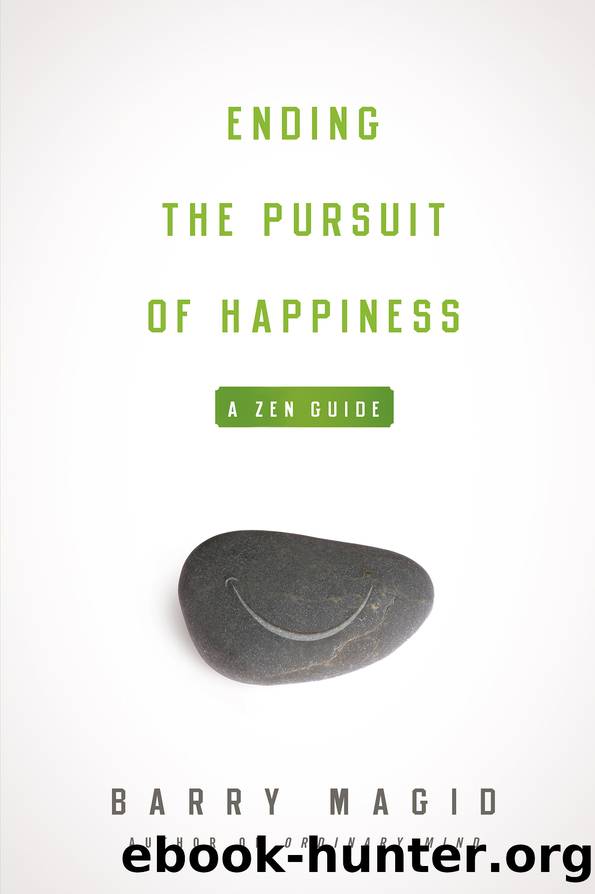Ending the Pursuit of Happiness by Barry Magid

Author:Barry Magid
Language: eng
Format: epub
Publisher: Wisdom Publications
CHAPTER SIX
LOVE, SEX, AND COMPASSION
1. DESIRE AND SUFFERING
In the previous chapter, we looked at the inescapability of suffering and how suffering is grounded in our human response to change and impermanence. One version of where practice is supposed to lead is an acceptance of impermanence. This is true, but it is only a half-truth, one that can give rise to the fantasy of being so open to change that we will no longer suffer. What we also come to accept through practice is the inescapability of desire. As an old master reminded us, âThe red thread of desire is never broken.â
Desire is a word with many connotations. In some contexts, it feels more appropriate to translate the Second Noble Truth (âThe cause of suffering is desireâ) using the words clinging or attachment instead of desire, thereby shifting its emphasis toward a resistance to Buddhaâs fundamental insight that all dharmas, including the self, are empty of a fixed, unchanging essential nature. This version of desire focuses on the suffering that arises from the desire that things shouldnât change. We want to have a rock-solid, unchanging relationship to something and particularly to another person. Desire in this sense is whatever attempts to deny the universal fact of impermanence. Since life wonât cooperate for very long with our attempts at denial, we inevitably will suffer.
We do have to accept the fact of change. We can come to understand that in many aspects of our life, but I think we face the greatest challenge when it comes to our personal relationships. Donât we have any right to expect constancy from our loved ones?âor is that too unrealistic an expectation? This longing for emotional constancy restores âdesireâ to its full emotional range, encompassing its everyday meanings of love, sexual attraction, and emotional need. All of these, I maintain, are as inescapably part of the human condition as the fact of change. Realizing that desire is intrinsically part of being human will sharply curtail our transcendent fantasies about ending suffering.
Psychologists (and parents) would, Iâm sure, universally agree that an infant requires a basic level of constancy and a sense of secure attachment in order to develop normally. That emotional constancy can take many shapes and there is no one way to be a good parent. The range and styles of adequate care-giving vary enormously. What we mean by developing ânormallyâ has equally many forms, some of which are only now being acknowledged, especially in the areas of gender and sexual identity. Psychoanalytic theory for too long equated normality with heterosexuality and maturity with narrowly defined roles for men and women.
In contemporary Western culture, there also has been an emphasis on the childâs need to develop the ability to separate from the mother and function independently without anxiety. In Eastern societies, such as India and Japan, much longer periods of familial dependence are the norm, and embeddedness in the family and society at large are valued more than autonomy. Social conformity may provide the link to a sense of a secure connection to the group as a whole, as well as to oneâs immediate family.
Download
This site does not store any files on its server. We only index and link to content provided by other sites. Please contact the content providers to delete copyright contents if any and email us, we'll remove relevant links or contents immediately.
Four Thousand Weeks by Oliver Burkeman(1853)
What Happened to You? by Oprah Winfrey(1767)
Karma by Sadhguru(1613)
This Changes Everything by Unknown(1509)
You Are a Badass: How to Stop Doubting Your Greatness and Start Living an Awesome Life by Jen Sincero(1186)
Don't Sweat the Small Stuff...and It's All Small Stuff by Richard Carlson(1121)
Infinite Circle by Bernie Glassman(1051)
How to Do the Work by Dr. Nicole LePera(1010)
Let's Talk About Hard Things by Anna Sale(994)
Declutter Your Mind: A step by step guide to learn to control your thoughts, stop worrying, relieve anxiety and eliminate panic attacks and negative thinking by Mia Chandler(968)
The 4-Hour Workweek by Timothy Ferris(959)
Who Moved My Cheese? by Spencer Johnson(959)
Real Strength: Build Your Resilience and Bounce Back From Anything by Psychologies Magazine(944)
The Path of Greatness--The Game of Life and How to Play It and Other Essential Works by Florence Scovel Shinn(928)
Breakup Bootcamp by Amy Chan(898)
Be Your Best Self by Mike Bayer(893)
Curative Magic by Rachel Patterson(886)
The Book of Hope by Jane Goodall(872)
Advice for Working Moms (HBR Working Parents Series) by unknow(868)
